The line from Ellesmere Port to Helsby still has a passenger service, operated by Northern Rail, but it's confined to a couple of trains each way early morning and two more round trips in the afternoon. Otherwise, you can catch a Merseyrail electric to Hooton, change for Chester then change again for Helsby. Instead of a ten minute direct journey, it can take the best part of an hour or longer, depending upon connections.
Ellesmere Port station
I was intrigued that what was a double track wayside station now operates as two back-to-back terminals.
 Ellesmere Port station. Merseyrail electrics use the far platform (platform 1); Northern Rail trains use the near platform.
Ellesmere Port station. Merseyrail electrics use the far platform (platform 1); Northern Rail trains use the near platform.
Merseyrail trains arrive in platform 1 on the down line and, when unloading and loading has taken place and the Driver and Guard have changed ends, the train departs via a trailing crossover at the Hooton end of the station (shown in the photograph below) to reach the Up line for the journey back to Liverpool. There's also a trailing connection in the Down line to the dock branch. This was originally closed over 20 years ago but was re-opened as a railhead in 2011 by Peel Ports and Quality Freight. A 2-aspect colour light signal controls departures onto the Up line; the subsidiary aspect is presumably for movements onto the dock branch. In the 'four foot' note the traction impedance bond and (foreground) the Train Stop Loops forming part of the Train Protection and Warning System (TPWS) installation.
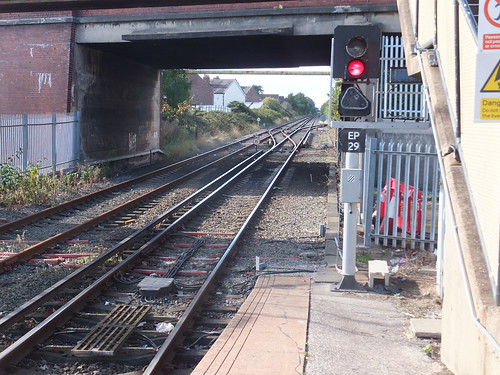 Ellesmere Port: View from platform 1 looking towards Hooton, showing the crossover used by electric trains. The single line diverging to the right serves the much-altered dock branch.
Ellesmere Port: View from platform 1 looking towards Hooton, showing the crossover used by electric trains. The single line diverging to the right serves the much-altered dock branch.
Looking towards Helsby, we're suddenly in the world of semaphore signalling (with a huddle of ground disc signals) operated from a manual signal box (a composite design with a brick base and a British Railways Standard top. The picture below is the view from the station footbridge looking towards Helsby. The third rail on platform 1 (left of picture) ends abruptly at the platform ramp. In the 'four foot' on the Up line, there appears to be an AWS Magnet to serve as a warning to trains approaching platform 2.
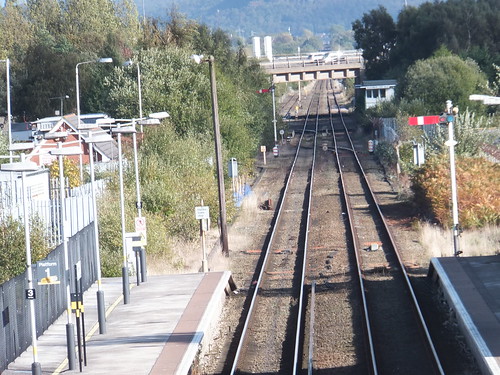 Ellesmere Port: View from station footbridge looking towards Helsby.
Ellesmere Port: View from station footbridge looking towards Helsby.
Ellesmere Port to Helsby
I wasn't too confident that my train for Helsby would materialise but, right on time, I saw the headlights of a Diesel Multiple Unit (DMU) approaching. On arrival, a few passengers alighted whilst two passengers and I joined the 2-car Class 156. The Driver and Guard changed ends and, with clear signals, we set off through the crossover onto the Down line, crossing over the Shropshire Union Canal near the signal box which proudly claimed to be 'Ellesmere Port No. 4'. I'm afraid it's now the sole survivor of five boxes which once controlled the major complex of sidings serving the docks and oil refineries. After a few minutes, we stopped at Ince and Elton station but I saw no-one get off or on. A few minutes later we made an equally unproductive stop at Stanlow and Thornton. A few more minutes and we stopped at our destination, Helsby.
Helsby Station
With two afternoon departures from Ellesmere Port only 30 minutes apart, I'd already correctly guessed that my train would go back to Ellesmere Port to form the final service. This time, a small cluster of people boarded and the DMU set of back to Ellesmere Port, regaining the Up line through a crossover.
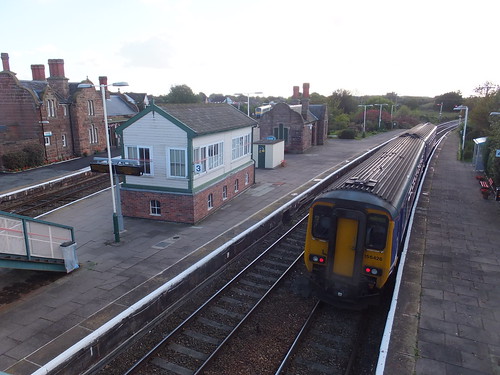 Helsby Station, with the train I'd arrived on from Ellesmere Port standing in platform 4, ready to return to Ellesmere Port.
Helsby Station, with the train I'd arrived on from Ellesmere Port standing in platform 4, ready to return to Ellesmere Port.
But I'd arranged a few minutes on Helsby station for photography. Of course, I was particularly taken by the LNWR mechanical signal box mounted between platforms 2 and 3. It's the first box I've seen with a locked 'cage' around the access steps (although I think this feature is being introduced more widely). I imagined that this might be to protect the public from a particularly violent breed of signalmen but I'm sure it's actually to protect signalmen from enraged passengers ('customers'?) when they despair of getting to their destination.
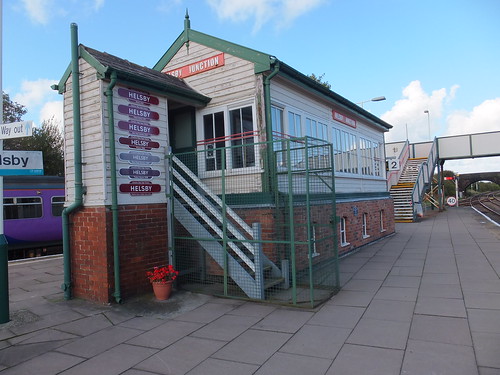 Helsby Junction Signal Box, showing the cage around the access steps.
Helsby Junction Signal Box, showing the cage around the access steps.
The wooden wall of the toilet displays a number of awards in the form of British Railways 'totem' signs recording Helby's success in the Cheshire Best Kept Station competition:-
Winner 2010Helsby is an attractive station and the semaphore signalling appealed to me (around the station area all upper quadrant tubular post signals). I could have waited for the train I'd arrived on to return from Ellesmere Port since it was then booked to go forward to Warrington. However, when an earlier Arriva Trains Wales service arrived from Chester direction bound for Manchester, I decided to take this train to Warrington Bank Quay.
Tidiest Station 2011
Best Kept Gardens 2012
Winner 2006
Best Kept Gardens 2007
Tidiest Station 2008
Cheshire West & Chester Award 2009
Helsby to Warrington and home
Our first stop was at Frodsham which has a handsome former station building of brick with stone quoins, window surrounds and detailing. Today's travellers are served by an ugly green 'bus shelter'.
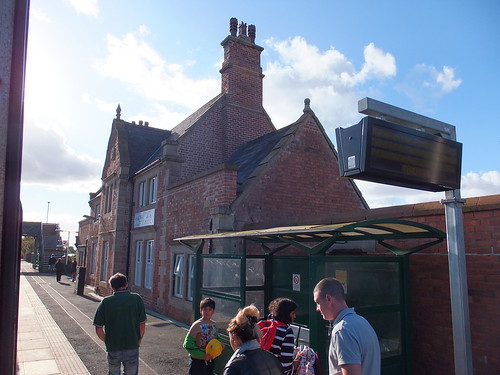 The handsome former station building at Frodsham.
The handsome former station building at Frodsham.
In just over a mile, we came to Frodsham Junction which initially had a double-line junction to Halton Junction on the Weaver Junction - Liverpool main line. A unidirectional single line remains, called the 'Down Chester-Liverpool'. There were once Up and Down Goods Lines extending towards Halton station on the Warrington line. The Up Goods Line survives but Halton station and its signalbox have gone.
We dashed through Sutton Tunnel (over a mile long) and made a brief stop at Runcorn East - another 'bus shelter'. We passed over the West Coast Main Line (WCML), where I spotted a Virgin 'Pedolino' heading quite slowly towards Warrington. Then we slowed on the approach to Acton Grange Junction where our line converged with the WCML and we came to a stand at the colour light protecting the junctions, WN239. After a short wait, we started to move and I found that the signal head and route indicator had been replaced by yet another variation of modern, Light Emitting Diode (LED) signal. The flat panel forming the route indicator looked very odd to my eyes - I'm old enough to remember the Air Raid Precaution (A.R.P.) design signal box at Acton Grange junction and semaphore signals. I always have a vision of a wheezing 'Super D' freight engine dragging a long loose-coupled freight up the gradient on the 'Old Line' towards the signal box. Well, the four tracks with double junctions remain, as does the massive lattice girder bridge carrying the four lines over the Manchester Ship Canal but otherwise the scene has totally changed.
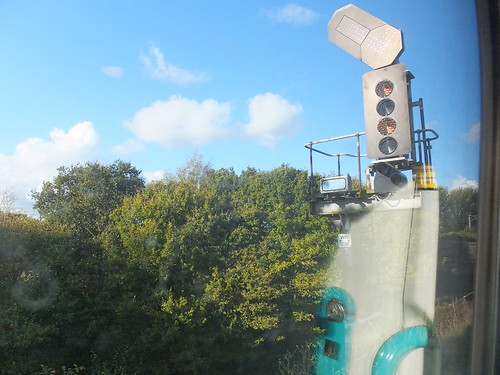 Acton Grange Junction - signal WN239.
Acton Grange Junction - signal WN239.
We were routed onto the Down Main (presumably following the 'Pendolino' which was nowhere in sight) and soon stopped at Warrington where I left the train. I had a few minutes to wait for the London via Birmingham New Street 'Pendolino' which would take me home. Whilst waiting, the Class 156 I'd left a Helsby arrived, discharged a few passengers and set off again, presumably now Empty Stock, on the Down Slow.
I found at least eight old bicycles, repainted, tied to pillars along the platform. Three successive bicycles of the up platform offered a message to passengers on arriving trains - 'Welcome' - 'to' - 'WBQ'. Coming across the last sign first, it took me a few seconds to realise that 'WBQ' was simply 'Warrington Bank Quay'. One of the bicycles carried a sign reading 'Have you reserved your bicycle?' so I'm not sure whether it was a Art Installation, an advert for Virgin's Bicycle Carrying Facilities, or both. It may be only a coincidence that the Warrington Contemporary Arts Festival was being held at the same time.
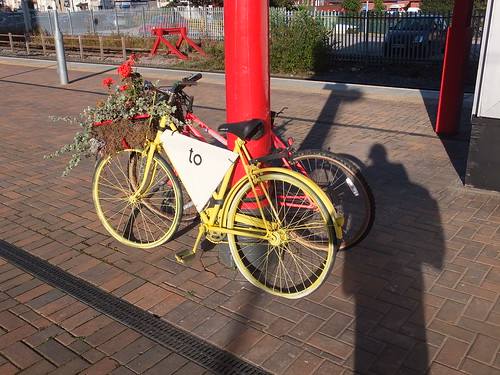 A pair of bicycles at Warrington Bank Quay, incorporating a floral arrangement.
A pair of bicycles at Warrington Bank Quay, incorporating a floral arrangement.
My pictures
Merseyrail.
Ellesmere Port - Helsby line.
Warrington Area rail.
